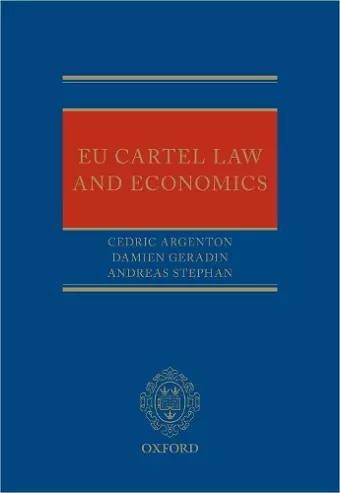EU Cartel Law and Economics
Damien Geradin author Andreas Stephan author Cedric Argenton author
Format:Hardback
Publisher:Oxford University Press
Published:12th Nov '20
Should be back in stock very soon

The significant evolution of EU competition law in the last 15 years has been fundamentally influenced by economic theory, and economic aspects of cartel prosecution are increasingly relevant in modern competition practice. EU Cartel Law and Economics is the first book-length assessment of cartels from an integrated law and economics perspective. This perspective allows for a more insightful evaluation of the wide variety of practices at the intersection between collusive restrictions of competition and pro-competitive agreements between firms. It sheds light on the underlying mechanics of cartels, including how to detect anti-competitive conspiracies in the absence of hard evidence. It also provides a more conceptual approach to cartel law, outlining ways in which the current legal structure can be applied more effectively to deter anti-competitive conduct without discouraging pro-competitive forms of cooperation between firms. The book is divided into four parts: the first part provides a conceptual overview of the law and economics of cartels; the second part describes the central legal analysis in cartel cases; the third part summarises the regulatory process in cartel investigations; and the fourth part deals with civil damages. EU Cartel Law and Economics is a topical and innovative reference work written by recognised experts in the field.
The present book is indeed the first comprehensive study that has been conducted on EU cartel law and economics. It can serve as guidance for scholars, practitioners and competition authorities from both economic and legal backgrounds. The authors succeeded at exploring all the economic and legal aspects of cartel enforcement while emphasizing in their analysis on the main and the most important issues that truly needed reform. Most importantly, they confirmed the fact that economic theory is crucial for the design and enforcement of an effective competition law, including cartel enforcement, which was demonstrated notably by the recommendations and proposals that they have put forward. * Fatma El-Zahraa Adel, Egyptian Competition Authority (Cairo), Concurrences *
This book covers a significant amount of ground, doing this very concisely. It engages with EU law and principles of microeconomics and game theory which can illuminate the competition rules. Both of these are complex disciplines. However, in its engagement, the book neither oversimplifies these matters nor does it engage in overly complicated, highly technical discussions (as many economics-oriented works are wont to do). It is eminently readable and should appeal to both lawyers and economists: to the former for its elegant discussion of the economic insights, and to the latter for its clear discussion of the law. * Dr Bruce Wardhaugh, European Competition Law Review *
This is the first comprehensive study of the overall impact of economics on cartel enforcement. The book aims to examine the extent to which EU cartel law is consistent with the economics of collusion and identify areas where greater reliance on economics might be desirable ... The authors also explain the answers to a number of key questions. Why do firms form cartels? Are cartels necessarily a bad thing? What is the social cost of cartels? This book, which is written in a clear, non-technical style, makes the theory, law and practice of cartel enforcement accessible to readers from both economic and legal backgrounds. * Kevin McVeigh, Elliott Duffy Garrett , The Law Gazette *
ISBN: 9780198702092
Dimensions: 252mm x 175mm x 23mm
Weight: 636g
336 pages